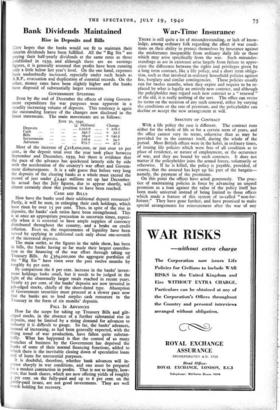Bank Dividends Maintained
Rise in Deposits and Bills
CITY hopes that the banks would see fit to maintain their interim dividends have been fulfilled. All the " Big Six " are paying their half-yearly dividends at the same rates as those established in 1939, and although there are no earnings figures, it is generally assumed that profits have been running only a little below last year's level. On the one hand, expenses have undoubtedly increased, especially under such heads as A.R.P., evacuation and duplication of essential records. On the other, money rates have been slightly higher and the banks have disposed of substantially larger resources.
GOVERNMENT SPENDING
Even by the end of December the effects of rising Govern- ment expenditure for war purposes were apparent in a steadily increasing volume of deposits. This tendency is again the outstanding feature of the changes now disclosed in the latest statements. The main movements are as follows: JUNE 30, 1940.
Deposits CC Millions) Change.
+ 218.5
Cash ...
242.7 + 32.7 Bills ... ... 364.o
+ 140.2
Investments ... ... 558.9 + 34.7 Advances 872.7 — 473
Most of the increase of £218,000,000, or just over 10 per cent., in the deposit total over the year took place between September and December, 1939, but there is evidence that the pace of the advance has quickened latterly side by side with the acceleration of the country's war effort and Govern- ment disbursements. It is a safe guess that before very long the deposits of the clearing banks as a whole must exceed the record of just under £2,441 millions set up last December. In actual fact the July figures, due to appear shortly, will almost certainly show this position to have been reached.
CASH AND BILLS
How have the banks used their additional deposit resources? Partly, it will be seen, in enlarging their cash holdings, which have risen by over 15 per cent. Thus, in spite of the rise in deposits, the banks' cash ratios have been strengthened. This is at once an appropriate precaution in uncertain times, especi- ally when it is essential to have ample supplies of currency distributed throughout the country, and a brake on credit inflation. Even so, the requirements of liquidity have been served by applying in additional cash only about one-seventh of the increased deposits.
The main outlet, as the figures in the table show, has been in bills, the banks having so far made their largest contribu- tion to the financing of the war effort through taking up Treasury Bills. At £364,000,000 the aggregate portfolios of the " Big Six " have risen over the past twelve months by roughly 65 per cent.
By comparison the 6 per cent. increase in the banks' invest- ment holdings looks small, but it needs to be judged in the light of the abnormally larger totals reached in recent years. Nearly 25 per cent. of the banks' deposits are now invested in gilt-edged stocks, chiefly of the short-dated type. Absorption of Government securities must proceed at a slower pace now that the banks are to lend surplus cash resources to the Treasury in the form of six months' deposits.
FALL IN ADVANCES
How far the scope for taking up Treasury Bills and gilt- edged stocks, in the absence of a further substantial rise in deposits, may be limited by a rising demand for advances to industry it is difficult to gauge. So far, the banks' advances, instead of increasing, as had been generally expected, with the rising trend of war production, have fallen quite substan- tially. What has happened is that the control of so many branches of business by the Government has deprived the banks of some of their normal financing functions, added to hich there is the inevitable closing down of speculative loans and of loans for unessential purposes. It is doubtful, therefore, whether bank advances will in- crease sharply in war conditions, and one must be prepared fur a modest contraction in profits. That is not to imply, how- ever, that bank shares, which are now offering yields of roughly 4 per cent on the fully-paid and up to 6 per cent. on the partly-paid issues, are not good investments. They are well worth holding for recovery.


































 Previous page
Previous page